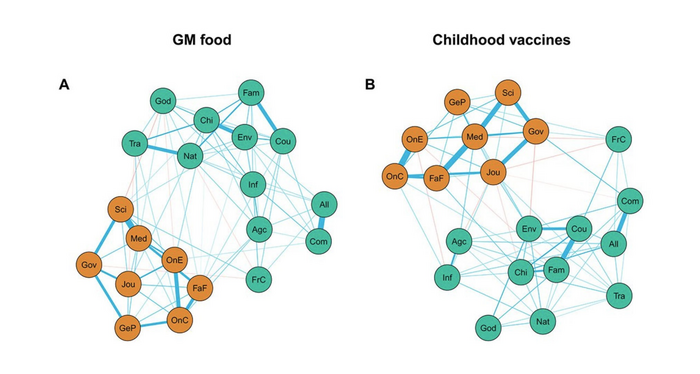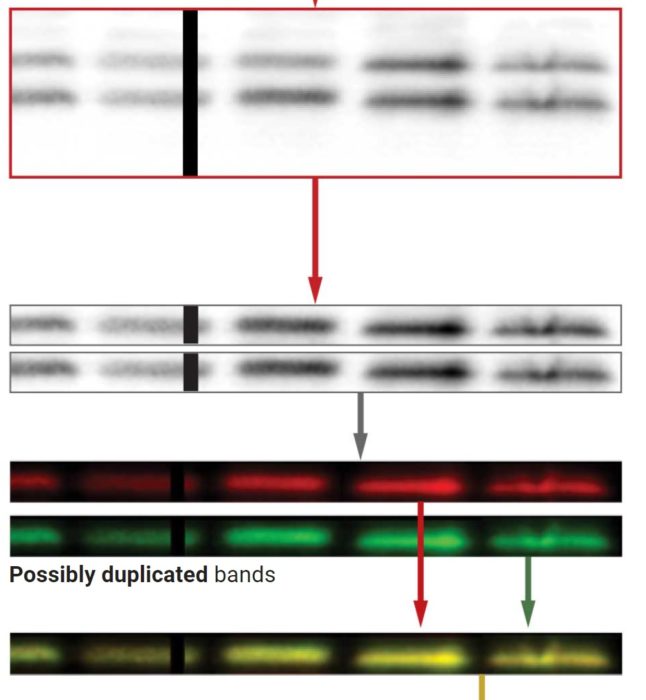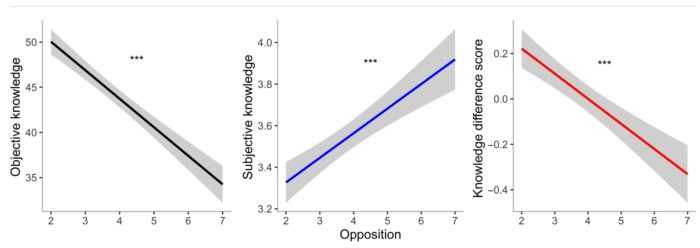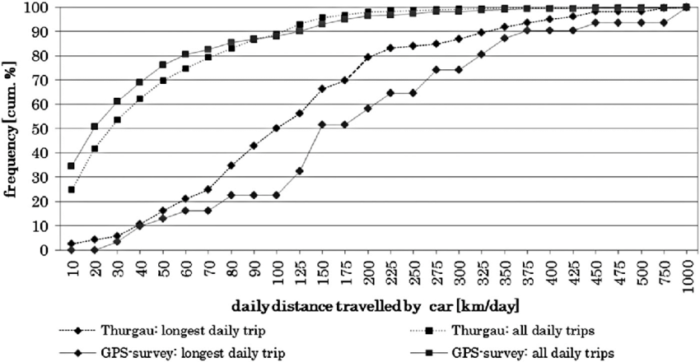Aug
23
2022
 How people make decisions has been an intense area of study from multiple angles, including various disciplines within psychology and economics. Here is a fascinating article that provides some insight into the state of the science addressing this broad question. It is framed as a meta-question – do we have the right underlying model that properly ties together all the various aspects of human decision-making? It is not a systematic review of this question, and really just addresses one key concept, but I think it helps frame the question.
How people make decisions has been an intense area of study from multiple angles, including various disciplines within psychology and economics. Here is a fascinating article that provides some insight into the state of the science addressing this broad question. It is framed as a meta-question – do we have the right underlying model that properly ties together all the various aspects of human decision-making? It is not a systematic review of this question, and really just addresses one key concept, but I think it helps frame the question.
The title reflects the author’s (Jason Collins) approach – “We don’t have a hundred biases, we have the wrong model.” The article is worth a careful read or two if you are interested in this topic, but here’s my attempt at a summary with some added thoughts. As with many scientific phenomena, we can divide the approach to human decision making into at least two levels, describing what people do and an underlying theory (or model) as to why they behave that way. Collins is coming at this mostly from a behavioral economics point of view, which starts with the “rational actor” model, the notion that people generally make rational decisions in their own self-interest. This model also includes the premise the individual have the computational mental power to arrive at the optimal decision, and the willpower to carry it out. When research shows that people deviate from a pure rational actor model of behavior, those deviations are deemed “biases”. I’ve discussed many such biases in this blog, and hundreds have been identified – risk aversion, sunk cost, omission bias, left-most digit bias, and others. It’s also recognized that people do not have unlimited computational power or willpower.
Collins likens this situation to the Earth-centric model of the universe. Geocentrism was an underlying model of how the universe worked, but did not match observations of the actual universe. So astronomers introduced more and more tweaks and complexities to explain these deviations. Perhaps, Collins argues, we are still in the “geocentrism” era of behavioral psychology and we need a new underlying model that is more elegant, accurate, and has more predictive power – a heliocentrism for human decision-making. He acknowledges that human behavior it too complex and multifaceted to follow a model as simple and elegant as, say, Kepler’s laws of planetary motion, but perhaps we can do better than the rational actor model tweaked with many biases to explain each deviation.
Continue Reading »
Aug
04
2022
This is a great idea, and in fact is long overdue. The NIH is awarding various grants to establish educational materials and centers to teach principles of scientific rigor to researchers. This may seem redundant, but it absolutely isn’t.
At present principles of research are taught in basic form during scientific courses, but advanced principles are largely left to individual mentorship. This creates a great deal of variability in how well researchers really understand the principles of scientific rigor. As a result, a lot of research falls short of scientific ideals. This creates a great deal of waste in the system. NIH, as a funding institution, has a great deal of incentive to reduce this waste.
The primary mechanism will be to create teaching modules that then can be made freely available to educational and research institutions. These modules would cover:
biases in research; logical fallacies around causality; how to develop hypotheses; designing literature searches; identifying experimental variables; and reducing confounding variables in research.
Continue Reading »
Jul
25
2022
 We are still relatively early in the investigation of possible fraud or misconduct relating specifically to amyloid beta (Aβ) in Alzheimer’s disease, so consider this all preliminary. However, independent analysis does allegedly find some highly suspect data in a series of images used in publications by one particular researcher, Sylvain Lesné of the University of Minnesota. Science magazine has done a good review of what we know at this time. I will quickly review the status of this investigation and what the whole episode means for scientific research in general, and Alzheimer’s research in particular.
We are still relatively early in the investigation of possible fraud or misconduct relating specifically to amyloid beta (Aβ) in Alzheimer’s disease, so consider this all preliminary. However, independent analysis does allegedly find some highly suspect data in a series of images used in publications by one particular researcher, Sylvain Lesné of the University of Minnesota. Science magazine has done a good review of what we know at this time. I will quickly review the status of this investigation and what the whole episode means for scientific research in general, and Alzheimer’s research in particular.
For background, Alzheimer’s disease (AD) is a complex neurodegenerative disease and the major cause of dementia, a chronic loss of global cognitive function, especially memory. AD has been extremely frustrating from a scientific and medical point of view. While there is a great deal of research and it has made impressive progress in understanding the pathophysiology of the disease, we remain without a single coherent “smoking gun” cause of the disease. The problem is (as with other neurodegenerative diseases) that there is a lot happening when brain cells age and die. The trick has been to not only identify markers of AD in the brain, but to understand what role those markers play in the disease. Specifically, are they driving the disease, or are they just a consequence of it?
In medicine there are two main ways to test a causal hypothesis for a correlational marker – can we transfer the disease by transferring the marker, and can we cure the disease by treating the marker? That last question is the ultimate goal of medical research, to find a cure, or at least a disease-modifying treatment. If we can prevent, slow down, stop the progression, or even reverse AD by interfering with one aspect of the disease, then that aspect is likely what’s driving it. But also – we have effective treatments, and everyone is happy.
This is where AD research gets very frustrating. Despite having many pathological clues to follow, researchers have been unable to close the loop – to find a disease-modifying treatment based on our basic science knowledge of AD. This leads to a lot of head-scratching and debate – is AD caused many by the build up of toxic proteins, by impaired neuronal function, by inflammation, or something else? One of the prominent theories of AD is that a major contributor to the disease is a build up of toxic protein, specifically amyloid beta (Aβ). But the Aβ theory has not led to a cure, which has led to many Aβ skeptics in the Alzheimer’s research community.
Continue Reading »
Jul
22
2022
 There has been a lot of research exploring the phenomenon of rejection of established science, even to the point of people believing demonstrably absurd things. This is a complex phenomenon, involving conspiracy thinking, scientific illiteracy, group identity, polarization, cognitive styles, and media ecosystems, but the research has made significant progress unpacking these various contributing factors. A recent study adds to the list, focusing on the rejection of scientific consensus.
There has been a lot of research exploring the phenomenon of rejection of established science, even to the point of people believing demonstrably absurd things. This is a complex phenomenon, involving conspiracy thinking, scientific illiteracy, group identity, polarization, cognitive styles, and media ecosystems, but the research has made significant progress unpacking these various contributing factors. A recent study adds to the list, focusing on the rejection of scientific consensus.
For most people, unless you are an expert in a relevant field, a good first approximation of what is most likely to be true is to understand and follow the consensus of expert scientific opinion. This is just probability – people who have an understanding of a topic that is orders of magnitude beyond yours are simply more likely to have an accurate opinion on that topic than you do. This does not mean experts are always right, or that there is no role for minority opinions. It mostly means that non-experts need to have an appropriate level of humility, and at least a basic understanding of the depth of knowledge that exists. I always invite people to consider the topic they know the best, and consider the level of knowledge of the average non-expert. Well, you are that non-expert on every other topic.
This is also why humility is the cornerstone of good scientific skepticism and critical thinking. We are all struggling to be just a little less wrong. As a science enthusiast we are trying to understanding a topic at a generally superficial technical level. This can still be a very meaningful and generally accurate understanding – just not technically deep or rigorous. It’s one thing to say – yeah, I get the basic concept of quantum computers, how they work, and why they can be so powerful. It’s another to be able to read and understand the technical literature, let alone contribute to it. Often people get into trouble when they confuse their lay understanding of a topic for a deep expert understanding, usually resulting in them becoming cranks.
Continue Reading »
Jul
01
2022
 The premise of the show Person of Interest is that the government has a powerful computer algorithm connected to all data from the surveillance state – social media, phone calls, e-mail, etc., and it uses this information to predict crimes. This, of course, is a massive invasion of privacy, so to get around that the algorithm gives limited information, just the identity of a “person of interest” with no information about the crime or their role in the crime (even if they are victim or perpetrator). Traditional investigation then has to backfill the rest.
The premise of the show Person of Interest is that the government has a powerful computer algorithm connected to all data from the surveillance state – social media, phone calls, e-mail, etc., and it uses this information to predict crimes. This, of course, is a massive invasion of privacy, so to get around that the algorithm gives limited information, just the identity of a “person of interest” with no information about the crime or their role in the crime (even if they are victim or perpetrator). Traditional investigation then has to backfill the rest.
Is this sort of AI-based surveillance in our future? The technology is being developed for national security. As long as the targets are outside the US, then there are no legal issues with privacy. Government use of this technology to monitor US citizens is, of course, already a controversy, but that’s not what I am writing about today. AI is also used in what is called predictive policing – predicting “hotspots” of crime and then deploying police resources to those hotspots. This superficially makes sense, but (as a new study points out) is more complex than it may appear.
The problem stems from a common mistake, looking at one component of a complex system instead of the entire system. In this case the simplistic predictive policing model used crime data to predict future crime hotspots, but it failed to consider the broader social environment and also the impact of any policing response. If there is one thing we learned from social science over the last century is that we may produce unintended consequences, even the opposite effect of what we desire, if we react simplistically to situations and don’t consider human psychology.
Continue Reading »
Jun
28
2022
 Often, contentious political and social questions have a scientific question in the middle of them. Resolving the scientific question will not always resolve the political ones, but at least it can properly inform the debate. The recent overturning of Roe v Wade has supercharged the debate about when human life begins. It may seem, then, that what science has to say about this question is important to the debate. But it may be less useful than it at first appears.
Often, contentious political and social questions have a scientific question in the middle of them. Resolving the scientific question will not always resolve the political ones, but at least it can properly inform the debate. The recent overturning of Roe v Wade has supercharged the debate about when human life begins. It may seem, then, that what science has to say about this question is important to the debate. But it may be less useful than it at first appears.
For example, in a recent editorial Henry Olsen, who is pro-life, asserts – “The heart of the abortion debate: What is human life?” I actually disagree with this framing. That is often a subtle and effective way to manipulate a debate – you assume a certain framing of the question that is biased toward one side. In this case, if the question is – what is a human life – then the pro-life side only has to argue that a fetus is a human life. But this framing is wrong on multiple levels.
Olsen is trying to frame this as a scientific question, but really the abortion debate is much more of a philosophical question. First let’s address what science questions there are.
Is a fertilized human embryo “human life?” Sure. It’s a living organism, and it is certainly human. But that’s not the only question. One could also ask – when does a fertilized egg become a person? That is a more nuanced question. I think there is broad agreement that a baby is a person. At the other end of the process we have a single cell. That cell may have the potential to develop into a person, but the cell itself is not a person.
At what point does a clump of cells become an actual person (again – not just the future potential of one)? This is an unanswerable question, as there is no sharp dividing line. There is no definable moment. There are milestones we can use to make some reasonable judgement calls. For example, one might argue that a person has to have the capacity for self-awareness, some sense of self and of being. This requires at least a minimally functioning brain.
Continue Reading »
Jun
06
2022
 Traffic jams cost the US economy an estimated $179 billion per year. That’s a pretty good incentive to invest in strategies to reduce the problem. Slow traffic is also a huge pain, causing significant stress and wasted time. (Remember the linear bias I wrote about recently, improving traffic speeds at the low end by avoiding jams has a huge effect on average driving speeds.) The causes of jams are various, including accidents and road construction, but some causes are “soft” in that they just happen due to driving patterns. Phantom traffic jams is one phenomenon, caused mainly by tailgating. When one driver slows even a little, the car behind them has to slow a bit more, and this continues until traffic stops for no apparent reason. Traffic light patterns is another cause. Hard causes need hard fixes, like expanding lanes and having adequate accident response infrastructure. But the soft causes can be mitigated by smarter driving and traffic control.
Traffic jams cost the US economy an estimated $179 billion per year. That’s a pretty good incentive to invest in strategies to reduce the problem. Slow traffic is also a huge pain, causing significant stress and wasted time. (Remember the linear bias I wrote about recently, improving traffic speeds at the low end by avoiding jams has a huge effect on average driving speeds.) The causes of jams are various, including accidents and road construction, but some causes are “soft” in that they just happen due to driving patterns. Phantom traffic jams is one phenomenon, caused mainly by tailgating. When one driver slows even a little, the car behind them has to slow a bit more, and this continues until traffic stops for no apparent reason. Traffic light patterns is another cause. Hard causes need hard fixes, like expanding lanes and having adequate accident response infrastructure. But the soft causes can be mitigated by smarter driving and traffic control.
This is where artificial intelligence (AI) enters the picture. Both of these significant causes of slowed traffic, better driving behavior and smarter traffic light control, can be improved with the application of AI. With respect to phantom jams, the solution seems to be to apply what researchers are calling bilateral control – this means that drivers should space themselves out so that they are equal distance between the car in front and behind them, rather than riding the tail of the car in front of them. Simulations show that adopting this driving pattern can reduce phantom traffic jams by 50%.
How can we implement this strategy? Driver education may help a little, but it is difficult to get a large number of people to make a behavior change, and the benefits really only occur when high percentages of drivers follow this pattern. Some level of driver assist is therefore needed. Short of full self-driving capability, it’s possible to enact bilateral control with a driver assist tweak to cruise control. Even just providing feedback to the driver to back off to an optimal distance from the car in front of them could work. This is a relatively simple fix that can be rapidly implemented.
Continue Reading »
May
27
2022
 I guess some good came out of Brexit. The EU essentially has banned GMO (genetically modified organisms) products, which I believe is unscientific and overly restrictive. Anti-GMO attitudes are demonstrably correlated with poor knowledge about agriculture and genetics. That’s because anti-GMO attitudes were largely created by a propaganda campaign based on lies and disinformation. For example, many people who oppose GMOs claim that Monsanto sued farmers over accidental contamination. This is absolutely not true, but it successfully demonized the industry.
I guess some good came out of Brexit. The EU essentially has banned GMO (genetically modified organisms) products, which I believe is unscientific and overly restrictive. Anti-GMO attitudes are demonstrably correlated with poor knowledge about agriculture and genetics. That’s because anti-GMO attitudes were largely created by a propaganda campaign based on lies and disinformation. For example, many people who oppose GMOs claim that Monsanto sued farmers over accidental contamination. This is absolutely not true, but it successfully demonized the industry.
The UK is now free to make up their own regulations regarding GMOs and they appear to on the verge of loosening their restrictions. However – they are limiting this loosening to “gene-edited” organisms and only plants (not animals). It’s a half-step, but at least it’s in the right direction. What is the difference between genetically modified and gene-edited?
“Gene-edited” is a new category, covering genetic changes that were previously lumped in under GMO, primarily because of the availability of new technology. A gene-edited crop is one in which one or more genes were either turned on or off, but no new genetic material was added. GMO is now limited to organisms where new genetic material is added (either cisgenic if from the same species, or transgenic if from a different species). Why the difference? It’s all ultimately arbitrary, not based on any rational science. For example, you can use radiation or chemicals to rapidly mutate crops, plant hundreds of the mutants, and then select the ones that happen to have desired traits (a process called mutation farming). That’s OK, and not considered genetically modified. Such plants even count as “organic” (another arbitrary label). But if you precisely insert a known gene, that somehow is considered a GMO and demonized by a large segment of the population.
Continue Reading »
May
23
2022
 Demand for electric vehicles (EVs) is increasing, but still there is lingering hesitancy to make the switch to EVs. Sales of EVs have been increasing geometrically over the last decade, with global sales reaching 6.6 million in 2021, compared to 66.7 million total vehicles sold. While this trend is encouraging, there is still a long way to go and the global warming clock is ticking. So what barriers remain to more complete adoption of EVs?
Demand for electric vehicles (EVs) is increasing, but still there is lingering hesitancy to make the switch to EVs. Sales of EVs have been increasing geometrically over the last decade, with global sales reaching 6.6 million in 2021, compared to 66.7 million total vehicles sold. While this trend is encouraging, there is still a long way to go and the global warming clock is ticking. So what barriers remain to more complete adoption of EVs?
Up front cost is still an issue, but this has been largely mitigated by the availability of more EV options that are in the range of comparable internal combustion engine (ICE) vehicles. Also the total cost of owning an EV is cheaper. According to a 2020 analysis:
For all EVs analyzed, the lifetime ownership costs were many thousands of dollars lower than all comparable ICE vehicles’ costs, with most EVs offering savings of between $6,000 and $10,000. While new EVs were found to offer significant cost savings over comparable ICE vehicles, the cost savings of 5- to 7-year-old used EVs was found to be two or three times larger on a percentage savings basis.
That was also before the recent spike in gasoline prices, and such spikes are not rare and likely to happen during the course of owning an EV. I wrote recently about the local health benefits of reducing pollution. I own an EV and I can also attest to other practical benefits. The driving performance is excellent, better than any ICE car I have driven. I can “fill up” at home and never have to take the car to a gas station. There is also limited routine maintenance – no oil changes or all the other things that go with an ICE. Because of regenerative braking the brake pads also last much longer. The tires are really the only thing that require attention. It is simply a superior car-owning and driving experience, and the money saving is nice.
Continue Reading »
Apr
07
2022
 Have you ever done the thought experiment where you imagine yourself back in time, in a technologically primitive society? What would life really be like, and what could you do to improve it? We are fairly dependent on our modern technology, and that does not give us the knowledge or skill to understand pre-industrial technology. Would you know how to design and build a flush toilet, for example?
Have you ever done the thought experiment where you imagine yourself back in time, in a technologically primitive society? What would life really be like, and what could you do to improve it? We are fairly dependent on our modern technology, and that does not give us the knowledge or skill to understand pre-industrial technology. Would you know how to design and build a flush toilet, for example?
But I have also come to realize that this thought experiment reflects my bias coming from an industrialized nation. You don’t have to go back in time to confront the challenges of lacking electricity, basic sanitation, or clean water. You just have to visit poor and developing parts of the world today. It’s not exactly the same situation, because the technology exists somewhere in the world, but that is not much help to the 1,800 children who die every day from diarrhea from contaminated water. This is another way that our developed-nation bias might manifest – I tend to get interested and excited about advances in technology at the cutting edge, squeezing another 10% out of the energy density of Li-ion batteries, for example. But the technologies that might help the most people are those that can bring basic affordable services to poor countries.
More attention is being paid to this problem. Low-income countries (LICs) lack the resources and institutional infrastructure to invest in the kinds of research most likely to benefit them, while high-income countries (HICs) are much better at leveraging research to improve their economies and standard of living. We tend to think of the X-Prize as progressing the most advanced technology, but even they are turning their attention to basic problems, such as literacy.
Continue Reading »
 How people make decisions has been an intense area of study from multiple angles, including various disciplines within psychology and economics. Here is a fascinating article that provides some insight into the state of the science addressing this broad question. It is framed as a meta-question – do we have the right underlying model that properly ties together all the various aspects of human decision-making? It is not a systematic review of this question, and really just addresses one key concept, but I think it helps frame the question.
How people make decisions has been an intense area of study from multiple angles, including various disciplines within psychology and economics. Here is a fascinating article that provides some insight into the state of the science addressing this broad question. It is framed as a meta-question – do we have the right underlying model that properly ties together all the various aspects of human decision-making? It is not a systematic review of this question, and really just addresses one key concept, but I think it helps frame the question.
 We are still relatively early in the investigation of possible fraud or misconduct relating specifically to amyloid beta (Aβ) in Alzheimer’s disease, so consider this all preliminary. However, independent analysis does allegedly find some highly suspect data in a series of images used in publications by one particular researcher, Sylvain Lesné of the University of Minnesota.
We are still relatively early in the investigation of possible fraud or misconduct relating specifically to amyloid beta (Aβ) in Alzheimer’s disease, so consider this all preliminary. However, independent analysis does allegedly find some highly suspect data in a series of images used in publications by one particular researcher, Sylvain Lesné of the University of Minnesota.  There has been a lot of research exploring the phenomenon of rejection of established science, even to the point of people believing demonstrably absurd things. This is a complex phenomenon, involving conspiracy thinking, scientific illiteracy, group identity, polarization, cognitive styles, and media ecosystems, but the research has made significant progress unpacking these various contributing factors. A recent study adds to the list, focusing on the rejection of scientific consensus.
There has been a lot of research exploring the phenomenon of rejection of established science, even to the point of people believing demonstrably absurd things. This is a complex phenomenon, involving conspiracy thinking, scientific illiteracy, group identity, polarization, cognitive styles, and media ecosystems, but the research has made significant progress unpacking these various contributing factors. A recent study adds to the list, focusing on the rejection of scientific consensus. The premise of the show Person of Interest is that the government has a powerful computer algorithm connected to all data from the surveillance state – social media, phone calls, e-mail, etc., and it uses this information to predict crimes. This, of course, is a massive invasion of privacy, so to get around that the algorithm gives limited information, just the identity of a “person of interest” with no information about the crime or their role in the crime (even if they are victim or perpetrator). Traditional investigation then has to backfill the rest.
The premise of the show Person of Interest is that the government has a powerful computer algorithm connected to all data from the surveillance state – social media, phone calls, e-mail, etc., and it uses this information to predict crimes. This, of course, is a massive invasion of privacy, so to get around that the algorithm gives limited information, just the identity of a “person of interest” with no information about the crime or their role in the crime (even if they are victim or perpetrator). Traditional investigation then has to backfill the rest. Often, contentious political and social questions have a scientific question in the middle of them. Resolving the scientific question will not always resolve the political ones, but at least it can properly inform the debate. The recent overturning of Roe v Wade has supercharged the debate about when human life begins. It may seem, then, that what science has to say about this question is important to the debate. But it may be less useful than it at first appears.
Often, contentious political and social questions have a scientific question in the middle of them. Resolving the scientific question will not always resolve the political ones, but at least it can properly inform the debate. The recent overturning of Roe v Wade has supercharged the debate about when human life begins. It may seem, then, that what science has to say about this question is important to the debate. But it may be less useful than it at first appears. Traffic jams cost the US economy an estimated
Traffic jams cost the US economy an estimated  I guess some good came out of Brexit. The EU essentially has banned GMO (genetically modified organisms) products, which I believe is
I guess some good came out of Brexit. The EU essentially has banned GMO (genetically modified organisms) products, which I believe is  Demand for electric vehicles (EVs) is increasing, but still there is lingering hesitancy to make the switch to EVs. Sales of EVs have been
Demand for electric vehicles (EVs) is increasing, but still there is lingering hesitancy to make the switch to EVs. Sales of EVs have been  Have you ever done the thought experiment where you imagine yourself back in time, in a technologically primitive society? What would life really be like, and what could you do to improve it? We are fairly dependent on our modern technology, and that does not give us the knowledge or skill to understand pre-industrial technology. Would you know how to design and build a flush toilet, for example?
Have you ever done the thought experiment where you imagine yourself back in time, in a technologically primitive society? What would life really be like, and what could you do to improve it? We are fairly dependent on our modern technology, and that does not give us the knowledge or skill to understand pre-industrial technology. Would you know how to design and build a flush toilet, for example?




